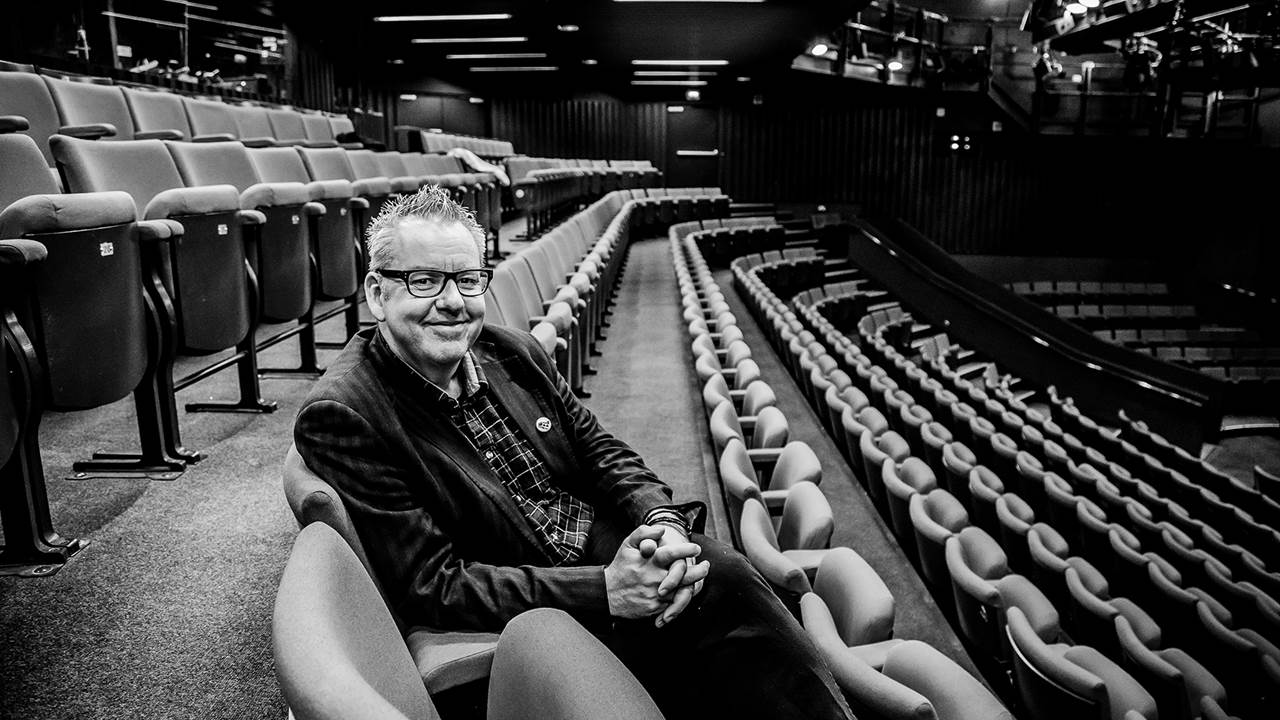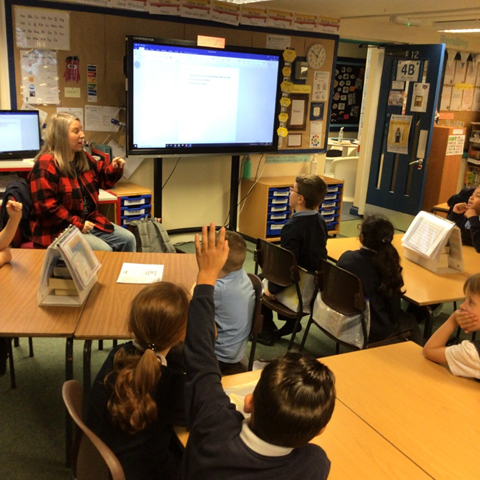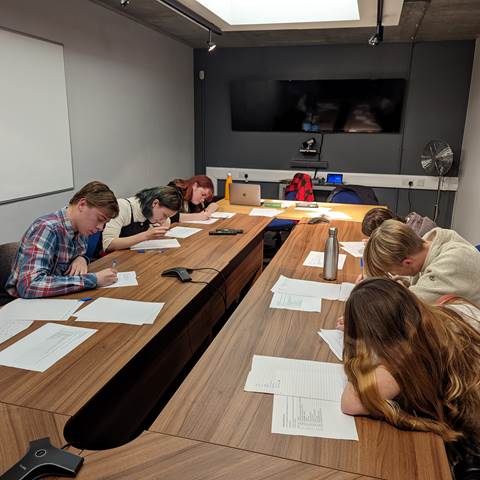Delving into Dialogue
Photo credit: Quentin Budworth
Dave Windass is a writer, artist and producer.
For Hull Truck Theatre, he has written Kicked Into Touch, Sully, On A Shout and Ballroom Blitz. He is currently developing new plays for the stage with Live Room Productions.
Dave shares with us the importance of getting dialogue right and the ways in which we should consider it as writers.
The building that would eventually become Hull Truck Theatre’s first bricks and mortar home, on Spring Street, was the first place I encountered theatre. Then the Humberside Theatre, it wasn’t a pleasant experience. Sitting in front of a theatre-in-education version of Shakespeare’s Twelfth Night, with Malvolio and Sir Toby Belch uncomfortably encroaching on my personal space and unable to comprehend what was going on because I hadn’t been paying much attention in English Lit, I was pretty certain that this wasn’t the artform for me.
Over two decades later, my first foray into writing a play appeared in the same space, the intervening years seeing me having avoided Jacobean and Elizabethan playwrights and, instead, finding some stuff that resonated with me and, at the Spring Street venue, some slightly better seating having been installed along with some incredibly rowdy air conditioning.
That rather odd first effort was a one act play set in a supermarket. While the setting was familiar enough – who hasn’t been in a supermarket? - it was an absurd piece, one in which the dialogue was ridiculously repetitive and often tripped into huge lists of what could be found on the shelves, and the normal conventions and dramatic structure of ‘well made plays’ was mostly ignored. Which might have said more about my limitations as a playwright at the time than any effort at originality. Although, in some respects, it was all a long-overdue reaction to my earlier Twelfth Night experience.*
Whatever your encounters with theatre, everyone and anyone should have a go at writing a play. Especially you. There are endless perspectives and world views, unheard, under-represented voices and untold stories that still need to be told on the nation’s stages. So have a go.
Whenever I’m running a writing workshop, aspiring and emerging playwrights often seem disappointed at the very simple advice I provide that all writers for the stage should embrace. In order to write plays you must watch as many plays and read as many plays as you possibly can. If you can access a library that has a well-stocked playscript section, you should work your way through each and every title and every author, A-Z.
If you are to write plays, you have to familiarise yourself with everything that has gone before and what is currently making it to the stage. It’s a tip so obvious it’s not really a tip at all but it never ceases to amaze me that many people fall at this first, crucial hurdle. There are no shortcuts and there can be no excuses. And the other top ‘tip’ is to write, and write, and write, at every opportunity.
Much of anyone’s first attempts at writing, including my own, are a journey in developing a unique and individual style and an original voice. As you read all of those plays on the shelves, one thing should strike you – the world doesn’t really need any more plays that are the same as those that have already been produced. The world requires you, and your writing, to be unique and for you to have your own characteristic style.
While theatre is a visual medium, for the playwright the most obvious way to do this is via dialogue. Some writers are very fortunate in that they are naturals at dialogue. Others have to work very hard at it. Some love writing dialogue. Others hate it. Either way, you’re going to have to give your characters something to say or there’ll be no play.
What makes great dialogue? It has to move your play forward. It has to reveal information about character and character motivations (without it ever becoming a dump of information). It has to help audiences understand the dynamics between characters. Every line of dialogue should do the above. Every line matters. Every word matters. Plays are not the place for people to indulge in small talk, unnecessary greetings and telling us things that we can clearly see for ourselves (“Good morning. My name is Dave. Who are you and why have you entered stage left carrying that mysterious object?”).
How do we get better at writing dialogue? We need to listen. The best dialogue writers are the best listeners. Writers are magpies, listening out for the shiniest examples of dialogue wherever they are. These days it’s simple to make a note of overheard conversations that might prove to be a significant prompt to propel your own ideas. Gone are the days of carrying cumbersome notebooks and quills – make use of that notes app on your phone and capture as much as you can.
Then there are the conversations you will be a part of during your day-to-day encounters. The more you listen to people, the more you realise that different perspectives result in different accounts of every conversation that takes place. To go back to that play set in a supermarket, while it was absurd, the dialogue was realistic to me, reflected the nonsense that I hear when my ears are open. People start sentences in the middle and then work their way towards either end; people talk in loops; there are ridiculous levels of repetition. Of course, most of that would be rather irritating in a play and not move things in the right direction but some attempt to capture the odd nature of human interaction could well make your dialogue fly.
There’s an interesting space in conversation that is the nub of drama and conflict - when people talk, what they say is, very often, a million miles away from what they actually mean. It’s not how they act. It’s not what they feel. They’re usually doing a terrible job of conveying their thoughts. What people say is never really expressing what they need. If it was, life would be much simpler to navigate.
Good dialogue, as well as moving your play forward, revealing information about characters and their motivations and the dynamics between each character, is about miscommunication and should never be about taking it in turns to articulate brilliant, coherent thoughts that allow everyone to understand each other.
Then there’s silence. The power of saying nothing. Or saying very little. What you need to do, when you’re writing, is convey what each character needs without ever explicitly stating it. The tricky thing, of course, is that the audience need to know what these needs are, and also what is preventing your characters from having these needs fulfilled (usually, it will be another character getting in the way).
Along with all of the other elements that come together to constitute a play, your dialogue and the scenes it propels should lead to a succession of ‘and then what?’ moments, the result being that your audience will want to continue on the journey with you and your characters.
So, watch a lot of plays, read a lot of plays. Read the best examples of dialogue and attempt to work out what the writer is doing. Listen. Keep an ear out for dialogue, in all its forms. Fill your notebook/notes app with snippets of dialogue and get to work on your own unique, characteristic style. Then write, write, and write.
*While it was a formative experience, I’ve since gone on to see loads of exceptional productions of the Bard of Avon’s work. Without a doubt, the Barrie Rutter-led Northern Broadsides allowed me to see (and hear) what I missed as an under-engaged and under-achieving teenager.
Related Posts
An introduction to 37 Plays with Kerrie L Marsh
Our playwriting officer Kerrie L Marsh introduces her newest project, 37 Plays.
Inspiring Hull to Write
Playwriting Officer Kerrie L Marsh talks more about the 37 Plays project and what she's been up to ...
Goblins, Frogs and Dogs, Oh My!
Our Young Writers group started their playwriting journey this week, and Kerrie tells us what they ...
Categories
- Mark and Jill’s South Africa trip 2015
- Amanda Huxtable, Change Maker
- Apprentice Blog
- Consequences: A Humberside Soap Opera



